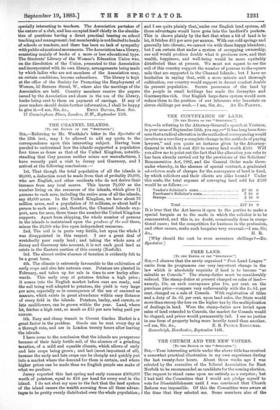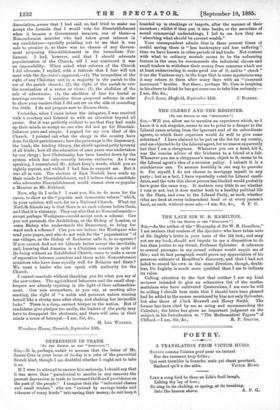THE CHURCH AND THE NEW VOTERS.
[To THE EDITOR OF THE " SPECTATOR." J
Sre,—Your interesting article under the above title has received a somewhat practical illustration in my own experience during the last twenty-four hours. About three weeks ago I was selected by the executive of the Liberal Association for East Norfolk to be recommended as candidate for the coming election. The request to stand came upon me entirely as a surprise ; but I had told the Committee that I would not pledge myself to vote for Disestablishment until I was convinced that Church Reform was impossible. Of this the Committee were aware at the time that they selected me. Some members also of the Association, aware that I had said so, had tried to make me accept the formula that I would vote for Disestablishment when it became a Government measure, one of them—a Nonconformist minister who had taken great interest in my candidature—specially pointing out to me that it was safe to promise it, as there was no chance of any Govern- ment proposing Disestablishment in the immediate Par- liament. I had, however, said that I should advocate popularisation of the Church, till I was convinced it was an impossibility. When asked what• reforms of the Church I did advocate, I replied, with a latitude that I fear will not meet with the Spectator's approval,—(1), The recognition of the right of any Christian sect in a majority in the parish to the use of the parish church ; (2), the right of the parish to veto the nomination of a rector or vicar; (3), the abolition of the sale of advowsons ; (4), the abolition of fees for burial or marriage service. I mention these proposed reforms in order to show your readers that I did not err on the side of conceding too little. I do not propose now to discuss them.
Yesterday, when I came before the delegates, I was received with a courtesy and listened to with an attention beyond all praise. But it was perfectly evident to me that they had made up their minds to accept no one who did not go for Disestab- lishment pure and simple. I argued for niv own ideal of the Church. I pointed out what the clergy in the country have done for:their parishioners; how the parsonage is the dispensary, the bank, the lending library, the shield against petty tyranny of all kinds ; how all the education of past years was undertaken by our clergy; how Christianity has been handed down by the system which has only recently become exclusive. As I was speaking, I remembered Mr. Albert Grey's words, which you so rightly reprint, and wished I had him to support me. But it was all in vain. The electors of East Norfolk have made up their minds for Disestablishment, and I believe that a candidate who advocates Disestablishment would unseat even so popular a Member as Mr. Birkbeck.
Now, why do I write ? I want you, Sir, to do more for the cause, to show us the "popular and democratic reform" which, in your opinion, will save for us a National Church. What my Norfolk friends say is that there is no such scheme before them, and that it is visionary. They say also that no Nonconformists— except perhaps Wesleyans—would accept such a scheme. Can you not persuade the Archbishop, or the Bishop of London, or some Bishop who understands the Democracy, to bring for- ward such a scheme? Can you not induce the Wesleyans who read your paper, and who do not wish for the " paganisation " of our villages, as the Bishop of Rochester calls it, to co-operate ? If you cannot, had not we Liberals better accept the inevitable, and, knowing that America is a Christian country in spite of its being without an Established Church, cease to make a cause of separation between ourselves and those noble Nonconformist ministers who have done equally well for Religion and State ? We want a leader who can speak with authority for the Church.
I cannot conclude without thanking you for what you say of the new voters. The agricultural labourers and the small shop- keepers are already rejoicing in the light of their enfranchise- ment. One sees everywhere, as you say, at meeting after meeting, the sight of "a noble and puissant nation rousing herself like a strong man after sleep, and shaking her invincible locks." There is a deep, earnest temper in the nation. But if candidates give pledges too easily, the leaders of the party may have to disappoint the electorate, and there will arise in their minds a sense of betrayal.—I am, Sir, &c., H. LEE WARNER.
Wrozham House, Norwich, September 13th.



































 Previous page
Previous page